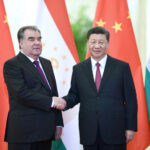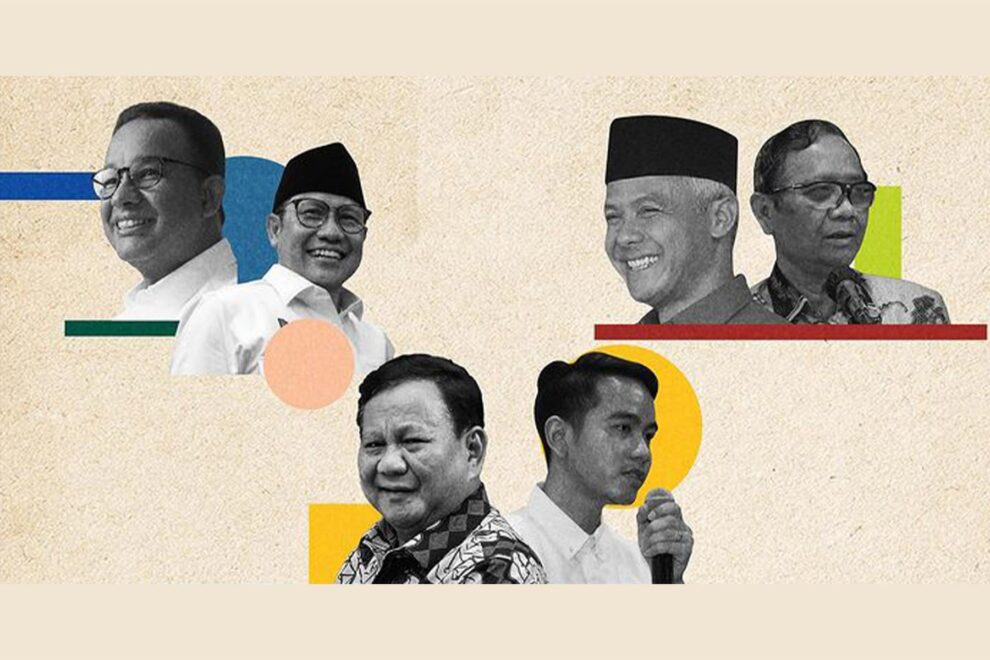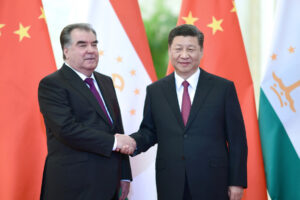All three candidate pairs contesting next year’s presidential election have vowed to push for more progress in tackling the climate crisis and related problems, but experts concur that their environmental vision and mission statements are not ambitious enough.
Three months before voting day on Feb. 14, 2024, candidate pairs Anies Baswedan and Muhaimin Iskandar, Ganjar Pranowo and Mahfud MD, and Prabowo Subianto and Gibran Rakabuming Raka have all published their campaign platforms.
In a contrast with past elections, all candidates have recognized the urgency of addressing climate issues, analysts say.
A panel of climate scientists have deemed that the energy transition is necessary to cut greenhouse gas (GHG) emissions to halt the rise in global temperatures to 1.5 degrees Celsius to prevent a calamitous impact on the planet and all living things.
For example, all candidates believe the country needs to shift away from its heavy reliance on fossil fuels to using clean and renewable energy.
Another issue they have addressed in their statements is deforestation, and an emphasis on the green and blue economies as potential solutions.
Here is a glimpse at their plans on tackling environmental and climate issues.
Anies-Muhaimin: Climate justice
The former Jakarta governor and the National Awakening Party (PKB) chairman present in their mission statement an eight-point environmental agenda, dubbed “Realizing Sustainable Ecological Justice for Future Generations”, which aims to achieve net zero emissions by 2060.
Social and ecological justice form the bedrock of their environmental platform. The majority of their programs emphasize intergenerational justice and the participation of affected communities, including indigenous people and other vulnerable groups, centering on the agency of younger generations.
Anies and Muhaimin promise to retire coal-fired power plants early, especially those on Java and Bali, while increasing the share of renewable energy in the national energy mix, although the pair did not set a specific target of by how many percent or when. To achieve their target, the pair promises an “interesting incentive scheme” to encourage community participation in clean electricity generation, on- or off-grid.
While they are committed to halting the construction of new coal plants, the pair will also support “sustainable mineral and coal downstreaming”.
The Anies-Muhaimin platform also pushes for the development of a green economy, for which they plan to set up a green economy index as an indicator of sustainable development.
The pair also has an ambition to turn Indonesia into a successful waste recycling hub, by pushing for businesses to adopt the 9R (refuse, rethink, reduce, reuse, repair, refurbish, remanufacture, repurpose and recycle) approach in supply chain management. They also promise to ban imports of hazardous waste.
Another Anies-Muhaimin program aims to strengthen forestry governance by developing community forest management through restoration and welfare improvement. This includes a focus on nature restoration, especially in regions with high carbon capture potential and high disaster risk.
The pair’s platform also highlights the importance of environmental data and its collection through regular biodiversity inventorying and monitoring across the country.
Ganjar-Mahfud: Environmental economy
The former Central Java governor and incumbent senior minister, who are backed by the Indonesian Democratic Party of Struggle (PDI-P), have laid out a three-pronged approach in their vision and mission statement, under a section titled “Accelerating the Implementation of a Sustainable Environment Through the Green and Blue Economies”.
Their plan lists several policies that aim to reduce GHG emissions, although it does not mention a concrete target for achieving net zero emissions.
Among these is an energy transition drive. Ganjar-Mahfud targets increasing the share of renewable energy in the national energy mix by up to 30 percent by 2029, double the share of 14 percent reached by 2022. They present an accelerated measure to reach this target by encouraging the development of community-based renewable energy (CBRE) programs in villages to maintain an independent electricity supply.
Their statement does not refer to any programs related to oil and gas or coal.
They also emphasize the development of a blue economy, promising to tap into its potential per year value of US$1.4 trillion for the national economy through inclusive and sustainable maritime governance. On the fishery industry, the pair envisions measured fishing based on quotas and zoning for equitable wealth distribution while preserving marine resources.
The Ganjar-Mahfud platform also emphasizes a circular economy, aiming to turn waste into an economically valuable resource for local communities. They prioritize the use of the 5R (reduce, reuse, recycle, repair and refabricate) approach to waste management.
They also promise to impose a moratorium to halt deforestation, but do not specify which activities would be suspended. They aim to expand forest conservation areas to benefit the surrounding communities.
Ganjar-Mahfud aim to continue the existing Climate Village Program (ProKlim), currently managed by the Environment and Forestry Ministry, renamed as the Climate Aware Village (KadarKlim) program.
Prabowo-Gibran: Environment for sovereignty
Unlike their rivals, the Gerindra Party chairman and Surakarta mayor offer a broad climate and environmental program that is generally linked to Indonesia’s sovereignty.
The pair aims to turn the country into a renewable energy and bioenergy superpower by continuing the existing early coal retirement plan to reduce its dependency on fossil fuels. But they also plan to build new oil refineries, ethanol plants and gas distribution infrastructure under state-owned or private enterprises.
They promote the environmentally friendly business practice of replacing plastic bags with recyclable packaging. They also plan to promote green product certification to ensure sustainable resources management.
As regards developing a blue economy, most of the pair’s programs and policies focus on improving national security and asserting the country’s sovereignty. These include a promise to restore the country’s reputation as a maritime axis by increasing its human resource capacity.
On the forestry sector, Prabowo-Gibran promise to rehabilitate damaged forests into either natural or production forests. But later, their statement outlines a program to turn the majority of damaged and primary forests into agricultural land, with a goal of achieving national energy sovereignty and creating jobs.
The pair promise to increase the research and development budget for wildlife and plant conservation.
Prabowo and Gibran also promote water self-sufficiency, promising to stop reclamation plans that violate existing laws and could cause environmental damage.
They promise to improve water reservoir management to anticipate floods during the rainy season and droughts during the dry season.
Need more than slogans
Experts expressed appreciation for the candidates for prioritizing the urgency of the climate crisis in their campaign platforms, in contrast to the election campaigns in 2019.
“We’re lucky that the conversation over climate change today is different from the last presidential election,” said Sonny Mumbunan, chair of the University of Indonesia’s Center for Climate and Sustainable Finance.
Yose Rizal Damuri, executive director of the Centre for Strategic and International Studies (CSIS), echoed the sentiment, citing a survey finding that only one out of 16 political parties referred to the environment in their campaigns for the 2019 elections.
Even so, Sonny said the candidates’ vision and mission statements still lacked clear, measurable goals within a certain time frame that were important and necessary for voters to examine.
The Ganjar-Mahfud and Prabowo-Gibran pairs do not mention a net zero target. While the Anies-Muhaimin pair target net zero emissions by 2060, this is slightly less ambitious than the current administration stated target of “2060 or sooner”.
To improve their climate and environment programs, Sonny suggested the candidates to explain their programs in more detail and how these would help achieve their GHG reduction targets, clearly defined in terms of time and scale.
Yose said the candidates could mention the words climate and environment “more explicitly and consistently”, instead of treating them as mere campaign slogans.
Source: Asia News Network















